Inside: Here are 6 powerful lessons when introducing Shakespeare to kids. Included are books for kids about Shakespeare and his plays; lessons from Shakespeare and how to prepare to go to a Shakespeare play.
Shakespeare Kids: Influence of Shakespeare
When I was 9 years old, my grandmother took me to see the opera, “Tannhäuser” by Richard Wagner. It was an outdoor production, I was sitting on a hard metal chair, but I was mesmerized! Why? Because it was something my grandmother loved. I loved her and wanted to love the things she loved, too.
Because of this initial experience as a child, I studied opera and went to various productions as an adult.
It’s not easy to introduce opera to young children—nor is it easy to introduce Shakespeare to young children. Initially, they are difficult mediums to understand. But today, there are many wonderful ways to introduce both Shakespeare and opera to the youngest of children.
Here are 6 ideas to introduce Shakespeare to children of all ages…
#1: Shakespeare Kids: Introduce Your Kids to Shakespeare
William Shakespeare is one of the greatest playwrights and poets who ever lived. Also called “The Bard,” (because he was considered the greatest poet ever) Shakespeare was born in Stratford on England in 1564 and died in 1616.
He wrote 37 plays, which are read and performed in countries all over the world.
In his play, Julius Caesar, Cassius says, “I, your [looking] glass Will [be and will] modestly discover to yourself [qualities] of yourself which you yet know not of.”
Shakespeare used his characters, each one having a special personality trait, for us to see a reflection of our own lives and make changes where needed. “Looking glass”—meaning mirror and he (Shakespeare) will hold this mirror up to us (through his characters) and show us our faults and virtues, strengths, and weaknesses.
As a result, his plays become cautionary tales for us and for our children and grandchildren.
#2: Shakespeare is not a Fraud!
Some people have indicated that Shakespeare was a fraud; that his plays, his characters, his words, etc., were copied from others making him nothing more than a copycat.
Consider this: during the 16th and 17th centuries, there were no copyright laws, and the authors, poets, and playwrights of the day borrowed and copied from each other—lines, plots, characters, and more. It was accepted. Many of Shakespeare’s characters are taken from history, and some may have been inspired by others, but his poetry and writing are his own.
The point is—instead of worrying if everything he wrote is absolutely his creation, judge him by what you learn and glean from what he wrote. Teach your children the same.
#3: Great books and Boxed Sets about Shakespeare for Kids
There are many books written for children of all ages to teach them about Shakespeare’s stories. Here are some favorites:
Flibbertigibbety Words by Donna Guthrie
This is a delightful book and provides the perfect way to introduce Shakespeare to young children and even college students. With captivating illustrations, children will get to know young Shakespeare as he goes on a wild goose chase to capture words that become part of his plays. Each page is filled with famous verses from various Shakespeare plays as well as illustrations of each play.
A charming book to introduce children of all ages to the characters and rich vocabulary that we associate with Shakespeare.
Here are some ways parents and educators can use this book at home and in their classrooms:
Idea #1:
Begin by showing your children/students a picture of Shakespeare and explain when and where he lived and something about one or two of his plays. There are illustrations in the book for many of his plays–show them to your children/students along with the famous line associated with each play
Idea #2:
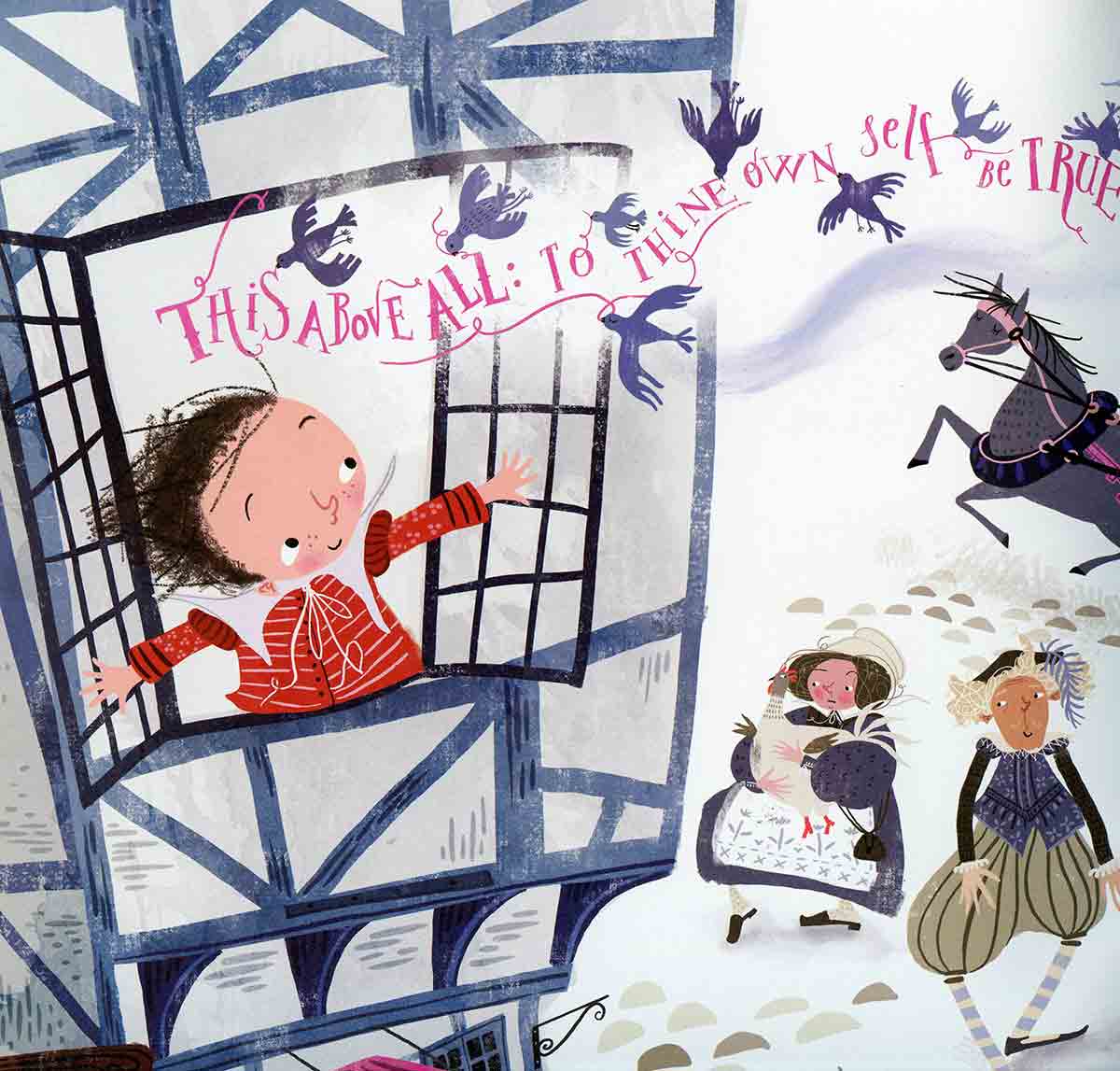
Each of the pages in the book, Flibbertigibbety Words has a famous line from one of Shakespeare’s plays–a wonderful introduction to Shakespeare for kids!
Have your child/student put themselves in the position of young Shakespeare. Help them to understand some of the disappointments and frustrations Shakespeare might have felt as he wrote his plays and searched for poetic words. How does this relate to the challenges your child/student faces when they are doing homework, writing, or doing school projects?
Idea #3:
Tap into what your child/student emotions by pointing out the facial expressions of young Shakespeare in the book. Depending on the age of the child, ask the following questions:
- “What do you think young Shakespeare is thinking?”
- “Why do you think he is frustrated, sad, or happy?” “How can you tell by his expressions?”
- “Why do you think words keep slipping away from Shakespeare? When you are writing a paper or essay–do you have problems coming up with compelling words? Do they float or run away in your mind? What can you do to fix that? What did young Shakespeare do in the book?”
Idea #4:
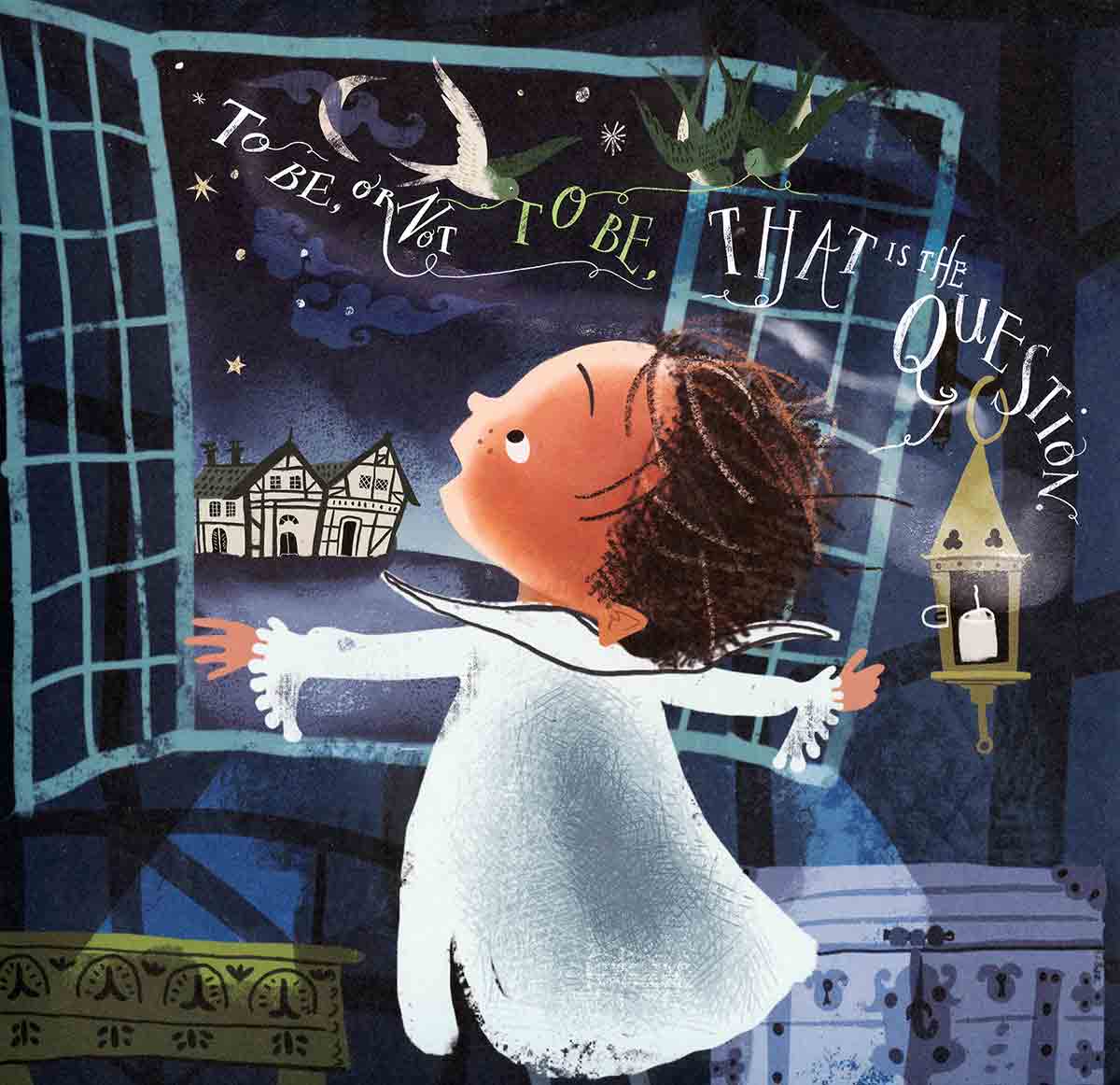
Shakespeare is a marvel! But, not for all young children and young adults. His prose can be daunting–here is a book that will help your children fall in love with Shakespeare at an early age and make him a part of their lives!
For high school and college students–read the famous verses from each page and have them guess what play they are from. Encourage them to add anything they know about the play. At the back of the book is listed all of the verses and plays they are from.
I taught college for 10 years and used children’s books many times to illustrate difficult concepts in simple ways. Children’s literature is a powerful medium that makes the complex simple. This is why this book is the perfect springboard to teaching children and young adults about Shakespeare!
Shakespeare Stories Box Set by Andrew Matthews (illustrated by Tony Ross)
These sixteen paperback books are perfect to use to introduce your young kids to Shakespeare. The beginning of each book introduces the characters in the story along with illustrations. Your child will be able to identify the good guys and bad. The plots are written in simple language and the illustrations are black and white. I have friends who read these books to children as young as five with great success!
Shakespeare for Kids: His Life and Times, 21 Activities by Colleen Aagesen
In this lively biography and activity book, your kids will experience William Shakespeare on a whole other level! Here are some of the things your kids/grandkids will learn how to do in this book which illustrates life in Elizabethan times:
- Staging
- Swordplay
- Juggling
- Creating authentic costumes like a flamboyant shirt with slashed sleeves or a lady’s lace-trimmed glove
- Making a quill pen to write a story
- Binding a simple book by hand
- Creating a fragrant pomander ball
- Baking a dish of stewed apples
Tales from Shakespeare by Marcia Williams
This book brings to life seven of Shakespeare’s plays: Romeo and Juliet, A Midsummer Night’s Dream, Hamlet, Macbeth, The Winter’s Tale, Julius Caesar and The Tempest. Using Shakespeare’s rich dialogue and in comic-book style, The Bard’s masterworks become relevant to young readers.
The comic book style is great for young readers and teens. According to the author, Jim Trelease, comic books introduce children to a rich vocabulary and exciting action that can’t be conveyed on a single page. Don’t dismiss comic-book style books!
Check these out on Amazon
#4: Attend a Shakespeare Play or Watch a Shakespeare Movie

Watch for Shakespeare productions in your community and take your children to see a Shakespeare play.
Each year in Ashland, Oregon, Cedar City, Utah, and many other states in the U.S. you can attend a Shakespeare festival complete with plays, movies, and activities the whole family can enjoy and participate in. Check on the Internet for places near you for Shakespearean festivals.
Several years ago, our family went to Cedar City, Utah to the Shakespearean festival. It was 4 days of jammed-packed plays, activities, and back-stage tours that left a HUGE impact on all of us. Seeing is believing and a powerful way to get your teens to fall in love with Shakespeare!
Also, the 4th graders at Hobart Elementary School in Los Angeles put on a yearly Shakespeare play. Under the direction of their amazing teacher, Rafe Esquith, they perform original Shakespeare plays, (not watered-down Shakespeare)—just as The Bard wrote them. It’s inspiring to see these young kids perform. Find out the dates and take the whole family!
If you need an easy way to introduce your kids to Shakespeare—watch one of the many movies Hollywood has produced. There are several versions of Romeo and Juliet as well as The Merchant of Venice, Hamlet, and Othello. Watch the different movie versions of Romeo and Juliet, including the modernized version, “West Side Story.” With your teens, compare/contrast the differences.
#5: Lessons Learned from Shakespeare to Discuss with Older Kids
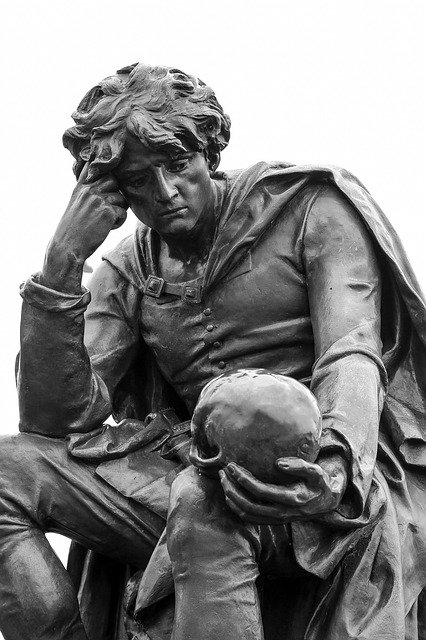
Hamlet (pictured) was voted the greatest book ever written, second only to the Bible. The writings of Shakespeare contain some five hundred references to the Bible.
Shakespeare wrote histories, comedies, tragedies, and romances and in all of them taught valuable lessons that are as relevant today as they were in the 16th century. Here are famous quotes from a few of his plays and the lessons taught. By the way—his comedies were not “ha-ha,” funny plays. Comedies were plays where the players learned valuable lessons in the end.
Romeo & Juliet:
- Quote: “Go wisely and go slowly. Those who rush stumble and fall.”
- Lesson: As you are making decisions, think about options and end results. Everything in life does not have to be accomplished at breakneck speed!

Romeo and Juliet is one of Shakespeare’s most beloved plays. There are several movie versions available and are a good way to introduce your teens to this play.
Merchant of Venice:
- Quote: “How far that little candle throws his beams.”
- Lesson: When making goals, don’t get bogged down in unnecessary details; remain focused on your long-term goals and make certain your actions and decisions aim towards accomplishments.
Hamlet:
- Quote: “This above all: to thine own self be true, And it must follow, as the night the day, Thou canst not then be false to any man.”
- Lesson: Be honest with yourself; in action and deed and if so, you will be honest with others. Hamlet was voted the greatest book ever written, second only to the Bible. Interesting because the writings of Shakespeare contain five hundred references to the Bible
Julius Caesar:
- Quote: “It is not in the Stars to hold our Destiny but in ourselves”
- Lesson: We are responsible for our lives and what we accomplish, it is not a matter of destiny.
#6: Shakespeare Helps Kids to Think
Reading and discussing great pieces of literature with your children is a powerful way to get them to THINK and to think critically.
Educators today are always looking for ways to help students to think. Reading Shakespeare definitely helps this process. Spend time everyday reading, discussing, and asking questions about Shakespeare’s plays with your kids. It’s one way to get your kids to think about and internalize what they are reading. Long-term, it will be one of the most valuable activities you do with them!
Do you have fun ways of introducing your kids, grandkids, or students to Shakespeare? Please comment in the section below.
This blog post is one of the “Tidbits of Wisdom for Parents” YouTube video series. Click here to see the video on “Here is the Most Amazing Way to Introduce Shakespeare to Kids.”
Want to remember this post? Post, “Here is the Most Amazing Way to Introduce Shakespeare to Kids” on your favorite Pinterest board!


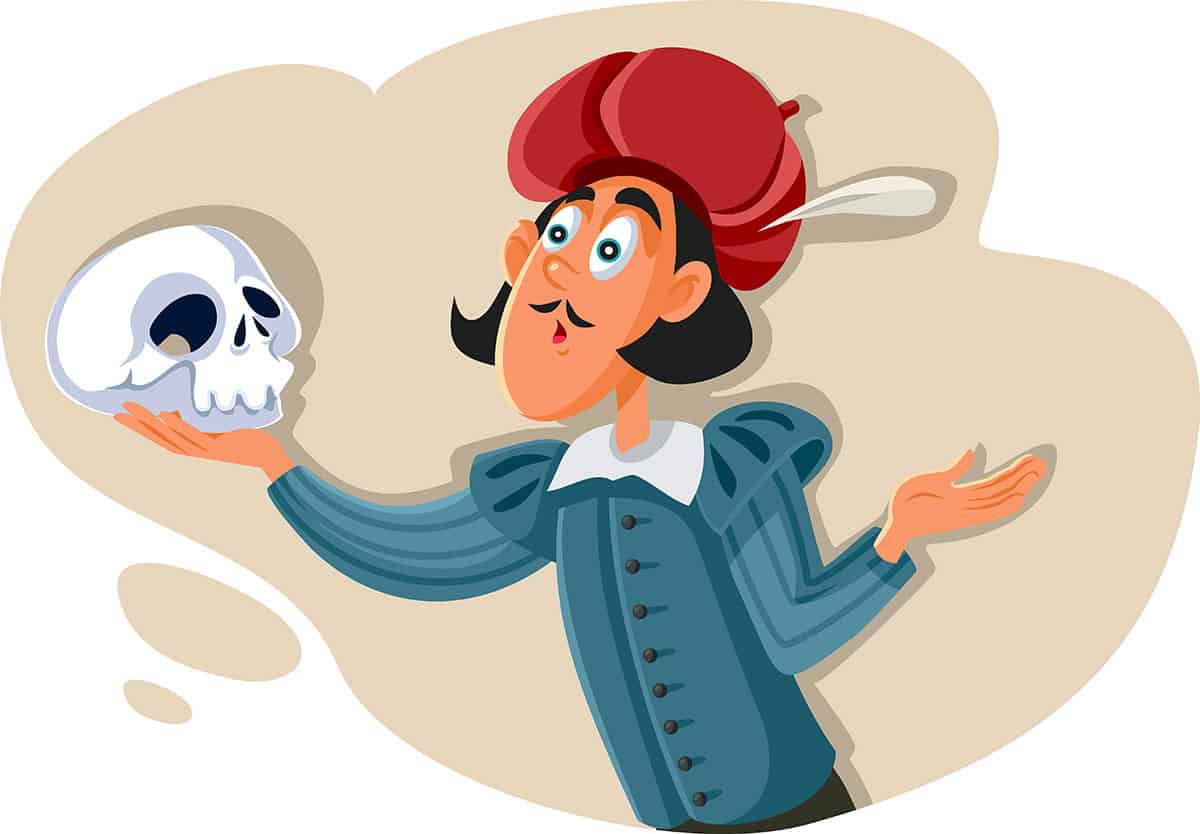
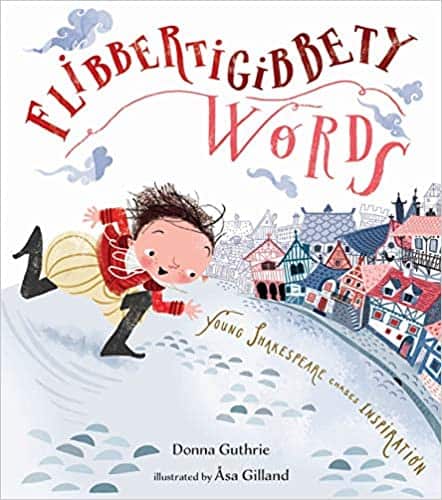
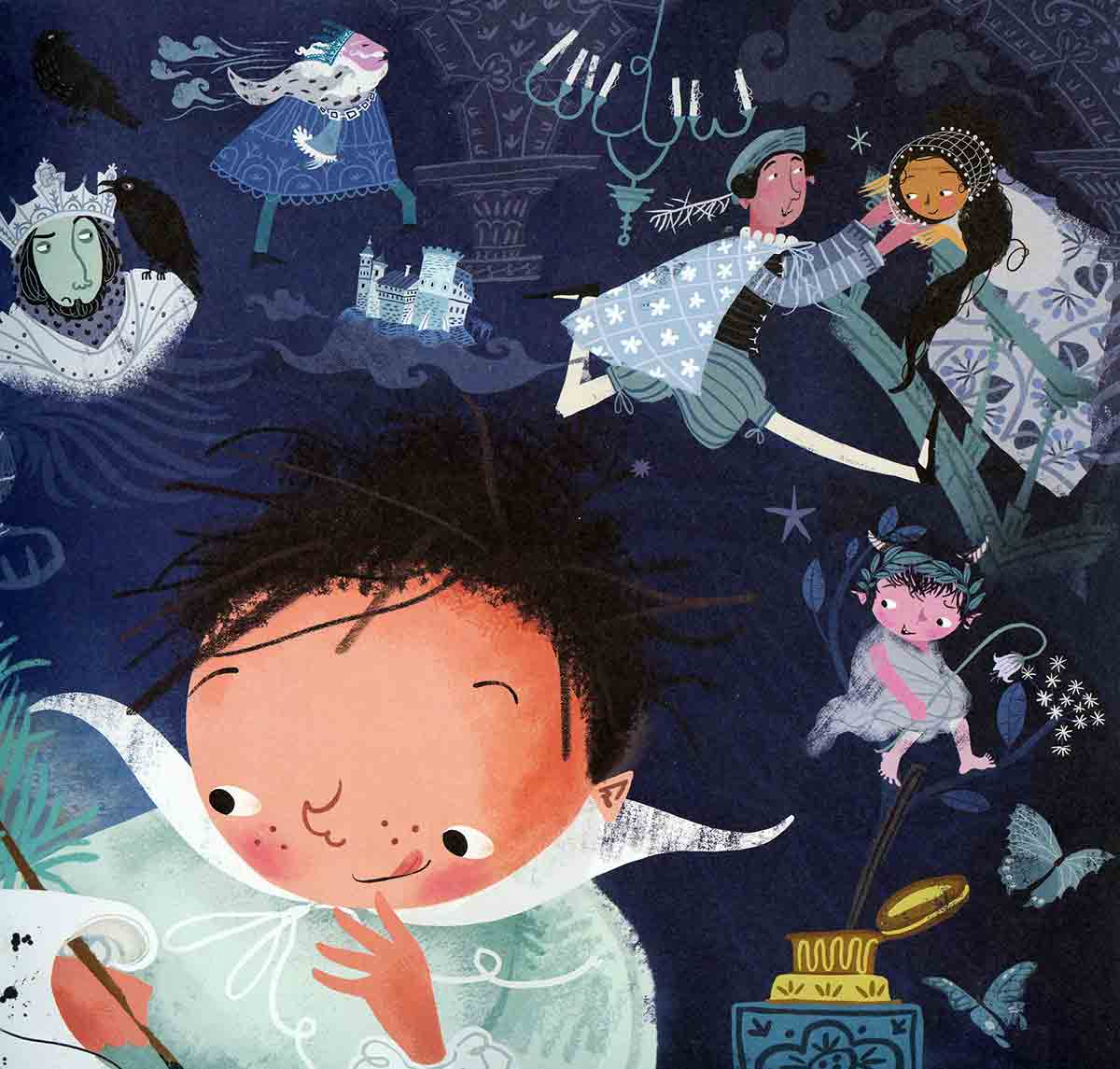

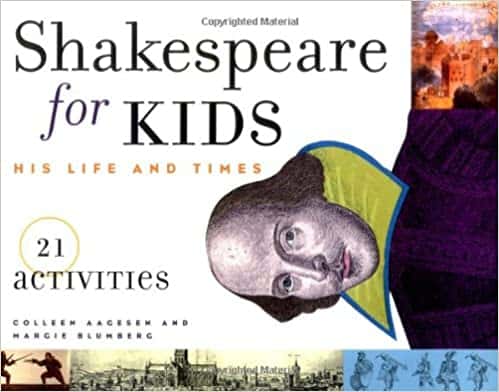
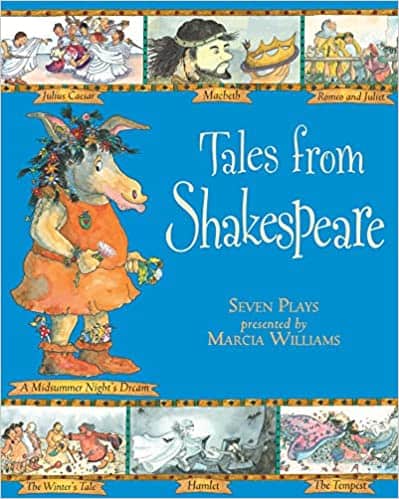

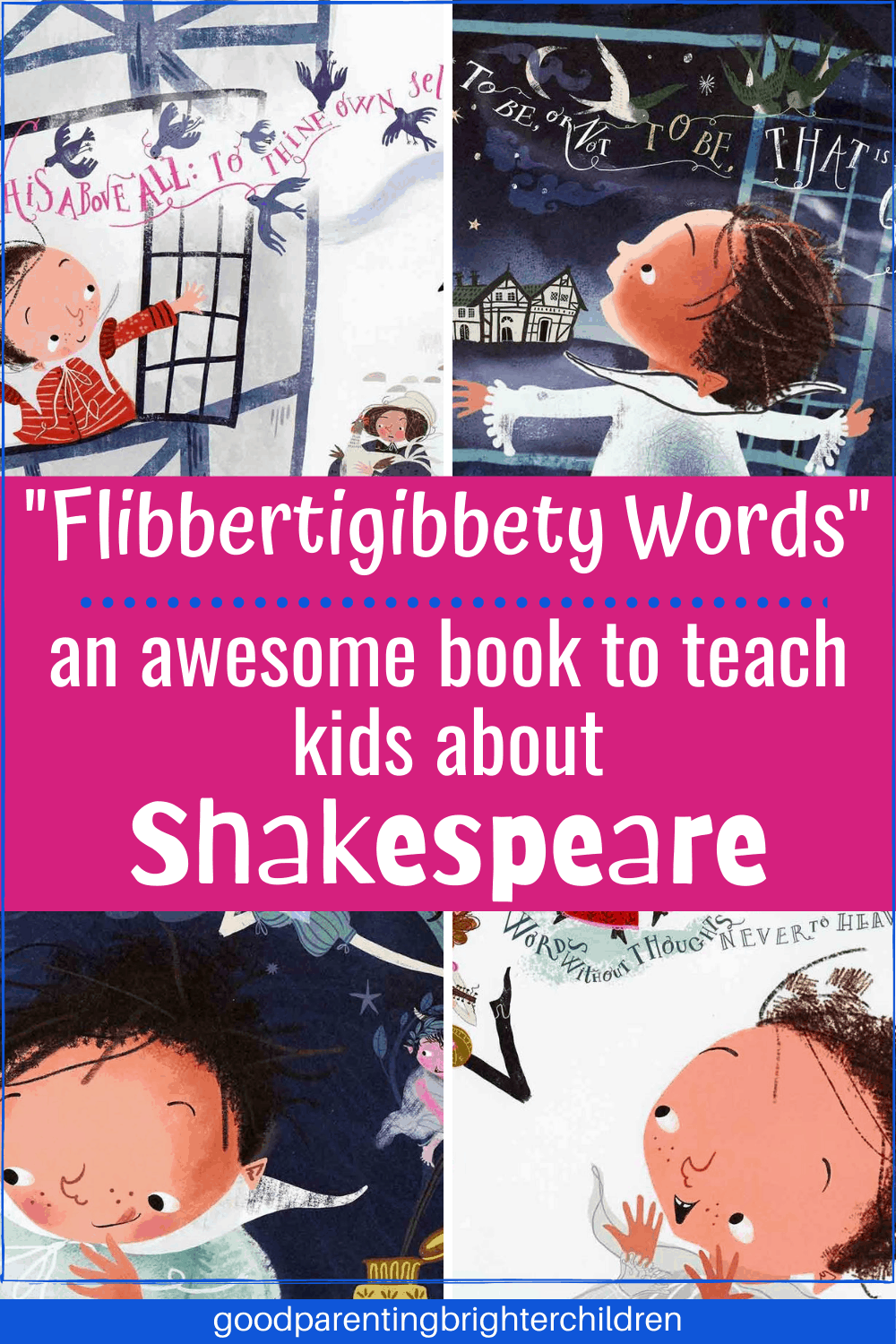
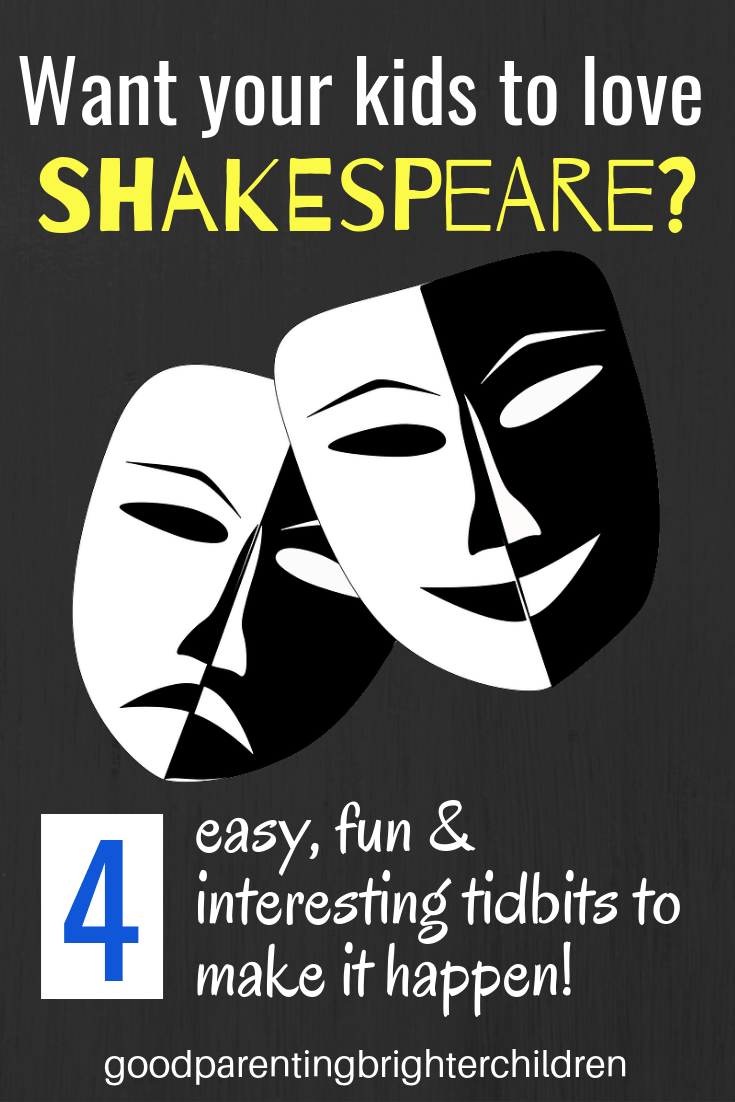
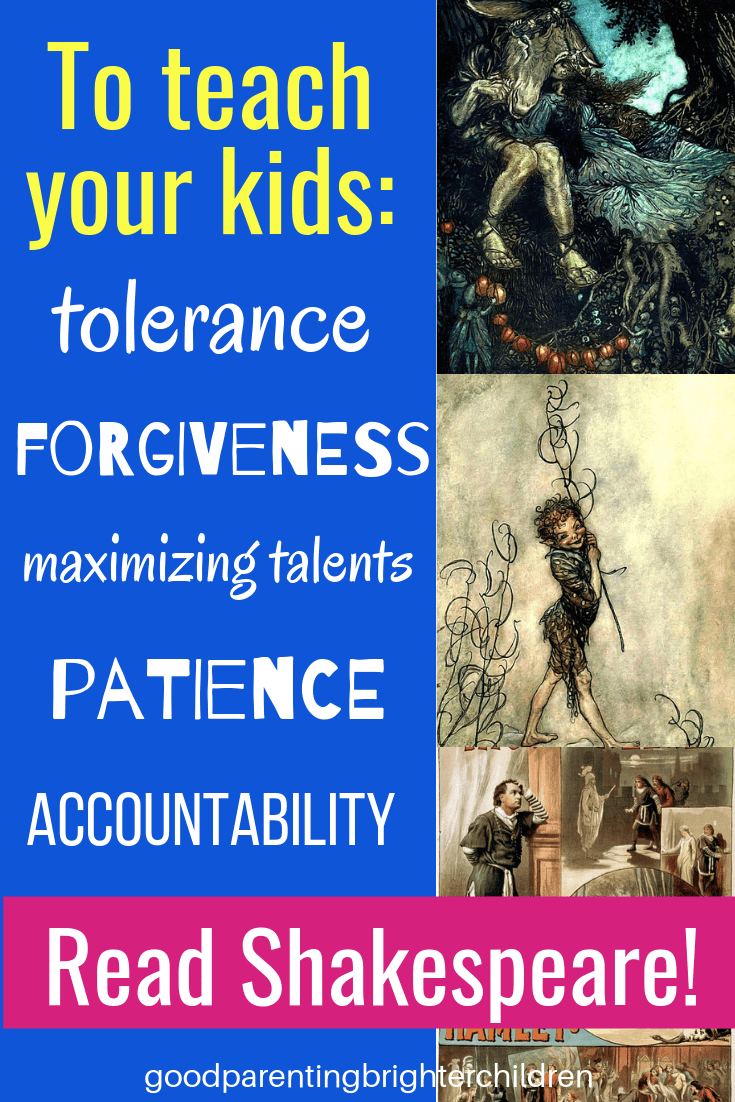


Great tips thanks~I’m getting ready to introduce my 8 year old to Shakespeare this homeschool year. One fun thing I did with my older son is do Shakespeare insults. There are mix and match lists online. Each day, before we read Shakespeare, we’d pick an insult and laugh together.
What a fabulous idea! Plus–doing Shakespeare insults will build your son’s critical thinking skills! You sound like a super creative mom! Thanks for sharing!
I think this is a wonderful resource for parents, teachers and most importantly children! I wonder if you would consider adding the following collection, which is created for young people of 13 plus?
kind regards and keep on doing what you are doing!
https://www.alphabetpublishingbooks.com/shakespeare/
Absolutely! Thank you for including the link–and what wonderful books to introduce young people to Shakespeare.
Love this! Teaching Shakespeare to younger students is a terrific idea! I know I would have benefited from such exposure.
Thank you, Cheryl! Yes, I agree! I would have benefited from this book as a child, too. It took me until high school to just start to appreciate and understand Shakespeare. And I think I’m still trying to understand Shakespeare!
Don’t beat yourself up, Tiffany–you are an amazing mom! There are so many resources available now–for even the youngest child to help them understand Shakespeare. I wish that I had had more than Cliff Notes in high school to understand Shakespeare. He is an amazing playwright to use when teaching kids how to think! As always–thank you for your insights and comments!
Point four is my absolute favorite, Sharlene! Share the lessons being taught in Shakespeare’s stories…this is genius. I wish I would’ve started this when my son was younger because now he’s in high school and struggling to get through some of these books. He would have definitely been more prepared had I started introducing him to Shakespeare earlier in life. Wonderful post!